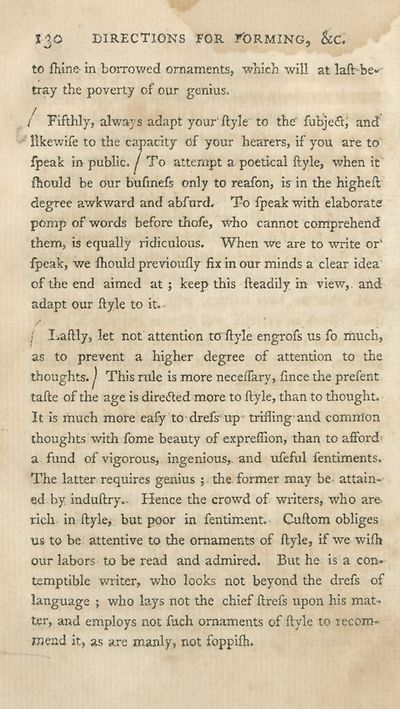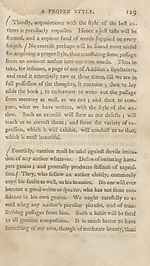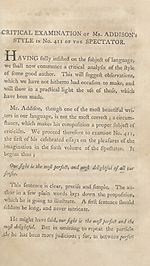Download files
Complete book:
Individual page:
Thumbnail gallery: Grid view | List view

I30 DIRECTIOKS FOR F'ORMING, &C.
to fhine- in borrowed ornaments, which will at laft be-
tray the poverty of our genius.
/ Fifthly, always adapt your'ftyle to the1 fubjed, and
•• like wife to the capacity of your hearers, if you are to
fpeak in public. / To attempt a poetical ftyle, when it
fhould be our bufinefs only to reafon, is in the higheft
degree awkward and abfurd. To fpeak with elaborate
pomp of words before thofe, who cannot comprehend
them, is equally ridiculous. When we are to write or’
fpeak, we fliould previoufly fix in our minds a clear idea
of the end aimed at ; keep this fteadily in view, and
adapt our ftyle to it.
; Laftly, let not attention to ftyle engrofs us fo much,
as to prevent a higher degree of attention to the
thoughts. J This rule is more neceffary, fince the prefent
tafte of the age is directed more to ftyle, than to thought.
It is much more eafy to drefs'up trifling and comnlon
thoughts with fome beauty of expreflion, than to afford
a fund of vigorous, ingenious,, and ufeful fentiments.
The latter requires genius ; the former may be- attain¬
ed by induftry.. Hence the crowd of writers, who are
rich in ftyle, but poor in fentiment. Cuftom obliges
us to be attentive to the ornaments of ftyle, if we wifh
our labors to be read and admired. But he is a con¬
temptible writer, who looks not beyond the drefs of
language ; who lays not the chief ftrefs upon his mat¬
ter, and employs not fuch ornaments of ftyle to recom¬
mend it, as are manly, not foppilh.
to fhine- in borrowed ornaments, which will at laft be-
tray the poverty of our genius.
/ Fifthly, always adapt your'ftyle to the1 fubjed, and
•• like wife to the capacity of your hearers, if you are to
fpeak in public. / To attempt a poetical ftyle, when it
fhould be our bufinefs only to reafon, is in the higheft
degree awkward and abfurd. To fpeak with elaborate
pomp of words before thofe, who cannot comprehend
them, is equally ridiculous. When we are to write or’
fpeak, we fliould previoufly fix in our minds a clear idea
of the end aimed at ; keep this fteadily in view, and
adapt our ftyle to it.
; Laftly, let not attention to ftyle engrofs us fo much,
as to prevent a higher degree of attention to the
thoughts. J This rule is more neceffary, fince the prefent
tafte of the age is directed more to ftyle, than to thought.
It is much more eafy to drefs'up trifling and comnlon
thoughts with fome beauty of expreflion, than to afford
a fund of vigorous, ingenious,, and ufeful fentiments.
The latter requires genius ; the former may be- attain¬
ed by induftry.. Hence the crowd of writers, who are
rich in ftyle, but poor in fentiment. Cuftom obliges
us to be attentive to the ornaments of ftyle, if we wifh
our labors to be read and admired. But he is a con¬
temptible writer, who looks not beyond the drefs of
language ; who lays not the chief ftrefs upon his mat¬
ter, and employs not fuch ornaments of ftyle to recom¬
mend it, as are manly, not foppilh.
Set display mode to:
![]() Universal Viewer |
Universal Viewer | ![]() Mirador |
Large image | Transcription
Mirador |
Large image | Transcription
| Antiquarian books of Scotland > Languages & literature > Abridgement of lectures on rhetoric > (146) |
|---|
| Permanent URL | https://digital.nls.uk/135468206 |
|---|
| Description | Thousands of printed books from the Antiquarian Books of Scotland collection which dates from 1641 to the 1980s. The collection consists of 14,800 books which were published in Scotland or have a Scottish connection, e.g. through the author, printer or owner. Subjects covered include sport, education, diseases, adventure, occupations, Jacobites, politics and religion. Among the 29 languages represented are English, Gaelic, Italian, French, Russian and Swedish. |
|---|

